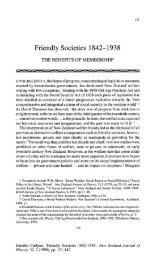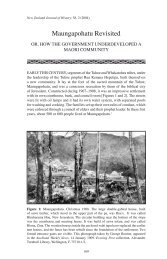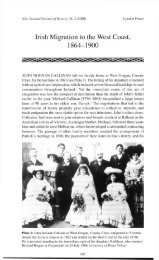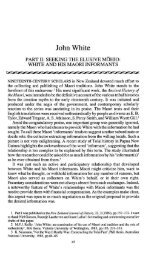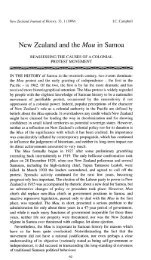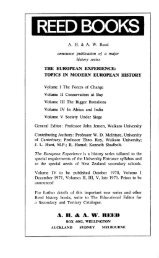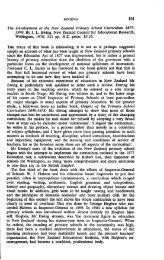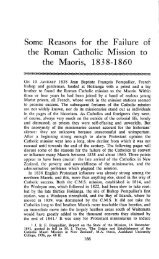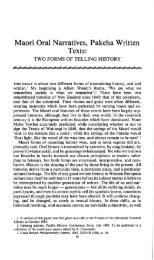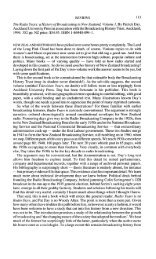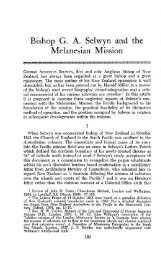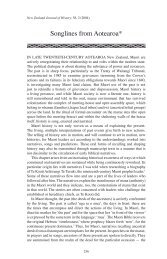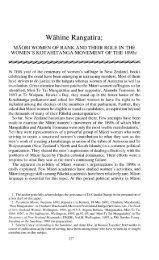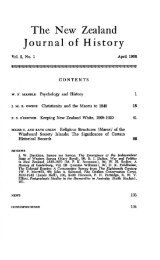Sulu and Sabah. By Nicholas Tarling. Oxford University Press, Kuala ...
Sulu and Sabah. By Nicholas Tarling. Oxford University Press, Kuala ...
Sulu and Sabah. By Nicholas Tarling. Oxford University Press, Kuala ...
You also want an ePaper? Increase the reach of your titles
YUMPU automatically turns print PDFs into web optimized ePapers that Google loves.
REVIEWS 195<br />
<strong>Sulu</strong> <strong>and</strong> <strong>Sabah</strong>. <strong>By</strong> <strong>Nicholas</strong> <strong>Tarling</strong>. <strong>Oxford</strong> <strong>University</strong> <strong>Press</strong>, <strong>Kuala</strong> Lumpur,<br />
1978. 385pp. U.K. price: £18.25.<br />
IN <strong>Sulu</strong> <strong>and</strong> <strong>Sabah</strong>, Professor <strong>Tarling</strong> presents a meticulously documented<br />
diplomatic history of the British connection with northern Borneo from the East<br />
India Company's ill-fated venture at Balambangan in the 1760s <strong>and</strong> 1770s to the<br />
ultimate incorporation of <strong>Sabah</strong>, formerly the Crown Colony of North Borneo,<br />
into the Federation of Malaysia in 1963. The book is in fact an exposition in<br />
depth of the bases of the Malaysian title to the area <strong>and</strong> the limits of its borders.<br />
In view of the Philippines government's competing claim to <strong>Sabah</strong>, which <strong>Tarling</strong><br />
also examines briefly in his conclusions, the story is of considerable contemporary<br />
interest.<br />
The policy objectives explored here are fundamental themes in the history of<br />
eighteenth <strong>and</strong> nineteenth-century British endeavour in Southeast Asia: the twin<br />
needs to safeguard her sea lanes to China <strong>and</strong> Australia, which traversed the<br />
region, <strong>and</strong> to extend her freedom of navigation <strong>and</strong> commerce within it. Britain<br />
sought the maximum of opportunity with the minimum of expense <strong>and</strong> complication,<br />
pressed always on one h<strong>and</strong> by British merchants <strong>and</strong> officials on the scene<br />
toward ever greater formal commitment <strong>and</strong> protection of their activities, restrained<br />
on the other by London's reluctance to face the financial burden <strong>and</strong><br />
European resentment accompanying the further acquisition of colonies.<br />
So much is familiar. What is unique to the North Borneo case is the unusually<br />
large number of interested parties <strong>and</strong> the consequent complexity of the factors to<br />
be weighed in policy formation. The area was claimed by both the Brunei <strong>and</strong><br />
<strong>Sulu</strong> sultanates, though the latter controlled it when the British first arrived there.<br />
It was located in a border zone between the established colonial spheres of Spain<br />
<strong>and</strong> the Netherl<strong>and</strong>s. <strong>By</strong> the mid-nineteenth century it was also neighbour to the<br />
Crown Colony of Labuan, the independent Raj of James Brooke in Sarawak,<br />
<strong>and</strong> open as well to trade <strong>and</strong> possible settlement by Germany, the United States<br />
<strong>and</strong> even briefly France <strong>and</strong> Italy. For as long as possible Britain depended on<br />
diplomatic manoeuvre among this crowd of competitors to preserve her interests<br />
without actual occupation. Even when, in the imperial scramble of the latter nineteenth<br />
century, this mechanism proved inadequate, she selected the unusual expedient<br />
of chartering a private trading firm, the North Borneo Company, to keep<br />
the area safely but still unofficially British rather than resorting to protectorate or<br />
annexation. She was then obliged to cope with the numerous anomalies resultant<br />
from the Company's de facto sovereign status, until it finally surrendered its<br />
rights to the Crown in 1946.<br />
As a history of British policy, <strong>Sulu</strong> <strong>and</strong> <strong>Sabah</strong> rests primarily on British<br />
documentary sources, <strong>and</strong> its focus is ultimately on London where the power to<br />
determine action resided. The motives <strong>and</strong> activities of the foreign governments,<br />
both European <strong>and</strong> Southeast Asian, are therefore presented as they were communicated<br />
to <strong>and</strong> understood by British officials. With regard to the interested<br />
European powers, who were rarely backward in transmitting their views to London,<br />
this approach succeeds. Professor <strong>Tarling</strong> unfolds his story of shifting<br />
alliances, treaties <strong>and</strong> protocols, legal interpretations <strong>and</strong> refutations, with little<br />
praise or blame for the actors <strong>and</strong> an unfaltering mastery of his material. At the<br />
local level, however, the concerns of the Brunei <strong>and</strong> <strong>Sulu</strong> Sultans <strong>and</strong> even Raja<br />
Brooke <strong>and</strong> the Labuan government occasionally emerge as mono-dimensional or
196 REVIEWS<br />
lacking in context.<br />
Part of the difficulty seems to be <strong>Tarling</strong>'s desire to avoid needless repetition of<br />
observations already presented in his earlier work, Britain, the Brookes <strong>and</strong><br />
Brunei, but as events in Brunei, Sarawak, <strong>Sabah</strong> <strong>and</strong> <strong>Sulu</strong> were intricately intertwined,<br />
<strong>and</strong> tended frequently to be considered as a whole by both local <strong>and</strong> London<br />
authorities, the problems of dividing the material are formidable. The present<br />
book is advertised as a companion volume to the former. It appears rather,<br />
despite a slightly different thrust, to be an extension of it, <strong>and</strong> regarding the<br />
period prior to the formation of the North Borneo Company, the reader is inclined<br />
to wish that the two books could have been published as a single multi-volume<br />
work, so interdependent <strong>and</strong> complementary are they.<br />
Similarly, in spite of its prominence in the title, <strong>Sulu</strong>'s role in the book is circumscribed.<br />
Within the frame of British policy toward North Borneo, the <strong>Sulu</strong><br />
Sultan functioned principally as the legal peg on which every cession of the area<br />
from 1761 had hung. Britain was therefore constrained to support his independence<br />
or at least the fiction of his independence vis-a-vis the Spanish for as<br />
long as possible. This was to the Sultan's advantage, but a successful British drive<br />
to engross the internal trade of North Borneo, long <strong>Sulu</strong>'s most valuable<br />
economic hinterl<strong>and</strong>, was not. According to at least one scholar, <strong>Sulu</strong>'s hold on<br />
the commerce of the region was not broken by the North Borneo Company until<br />
as late as the 1890s. 1 Tenure of North Borneo was of overriding concern to both<br />
Britain <strong>and</strong> <strong>Sulu</strong>, but because of their differing perspectives, the legal status of<br />
the matter, which so exercised the British, did not automatically reflect the real<br />
boundaries of the Sultan's freedom of action. What the reader misses in the narrative<br />
of British-Spanish-<strong>Sulu</strong> dealings, is an occasional alternative st<strong>and</strong>ard by<br />
which to judge it, when <strong>and</strong> how much the British view of <strong>Sulu</strong>, coloured as it was<br />
by diplomatic necessity, diverged from actual local circumstance.<br />
Strictly speaking, however, such questions lie outside the defined purpose of<br />
this book. In all that touches British concerns, what emerges is a skillful, often<br />
fascinating portrait of the multiple moves — from conflict to sometimes ungainly<br />
compromise, as each new challenge to her interest arose — by which Britain's imperial<br />
expansion in North Borneo gradually took form.<br />
Cornell <strong>University</strong><br />
LINDSEY REBER<br />
Pacific Isl<strong>and</strong>ers under German Rule: A Study in the Meaning of Colonial<br />
Resistance. <strong>By</strong> Peter J. Hempenstall. Australian National <strong>University</strong> <strong>Press</strong>,,<br />
Canberra, 1978. 264pp., illustrations, maps, end papers. Aust. price: $19.50.<br />
GERMANY lost her Pacific colonies in 1914. Yet until very recently only scant information<br />
on German rule has been available. At best it has been fragmentary,<br />
<strong>and</strong> it is still far from complete. It may be that this is due to the fact that it is the<br />
winners who write history. If so it should also be said that such neglect has been<br />
1 James F. Warren, Trade, Raid, Slave: The Socio-Economic Patterns of the <strong>Sulu</strong><br />
Zone, Ph.D. thesis, Australian National <strong>University</strong>, 1975.



